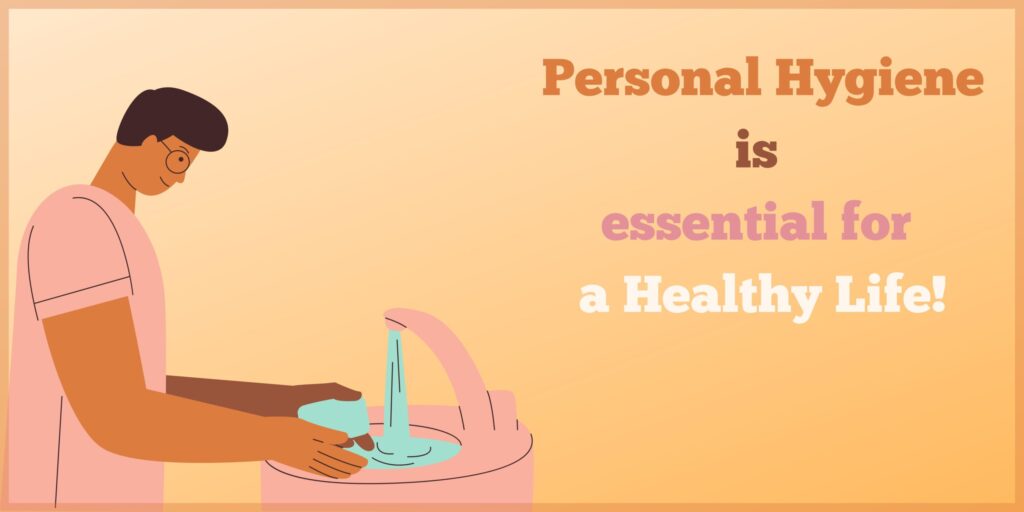Benefits of personal hygiene
The benefits of personal hygiene are discussed precisely in this article. Hygiene is the practice of doing certain things in a certain way to make the world cleaner and less likely to get sick or catch an infection.
This has to do with how tidily vegetables and meats are cleaned and prepared for eating. Hygiene also includes the systems we use to clean up human waste, like sewage systems. When people talk about hygiene, they usually mean taking care of one’s own health. Healthy bodies promote mental health. A healthy body Personal hygiene is what we do every day to keep our bodies clean.
Hygiene is vital for many reasons, like keeping things clean and stopping diseases from spreading. In the last paragraph, for example, we talked about sewer systems. These systems are clean because they keep human waste in one place and away from people. Human faeces have many dangerous germs that could cause illnesses and deaths that could be prevented.
Personal hygiene
Personal hygiene means taking care of yourself. This includes things like taking a bath, washing your hands and brushing your teeth, among other things.
You are exposed to millions of bacteria and viruses from the outside world every day. They can stick to your skin which functions as a protector and sometimes make you sick. Everyone can remain healthy if you take good care of yourself and others the around you. They can also make you like yourself more.
Lowering your risk of getting viruses and bacteria-related diseases and illnesses is included in the benefits of personal hygiene. Keeping up with your personal hygiene will also help stop the spread of infection. The history of personal hygiene dates back thousands of years.
The following things are part of personal hygiene:
- You should clean your body every day.
- Use soap to clean your hands after going to the bathroom.
- At least twice a day, you should brush your teeth.
- Utilise a tissue, when you sneeze or cough, to cover your mouth and nose.
- Wash your hands after you’ve been around pets or other animals.
Kinds of personal hygiene
Personal hygiene means something different to each person. When it comes to developing good hygiene habits, these are good places to start:
- Hands hygiene
- Toilet hygiene
- Sickness hygiene
- Shower hygiene
- Teeth hygiene
- Nail hygiene
Your mouth, eyes, nose, or ears are all easy ways for germs on your hands to get into your body. Get your hands clean:
- When you work with food.
- Prior to eating.
- If you handle trash.
- When you sneeze.
- Whenever you touch a pet.
Also, cleanse your hands after switching a baby’s diaper, support someone washes themselves, or clean up a cut or wound.
The benefits of personal hygiene include assisting in the improvement of health and the prevention of illness or disease later in life. After using the bathroom:
- Wash your hands.
- Wash in between your fingers, on the rear ends of your hands, and underneath your nails, as you attempt to clean for 20 to 30 seconds with soap.
- Thoroughly rinse under warm water, then pat dry with a fresh towel.
Kinds of hygiene continued
If you’re sick, you should take care not to spread your illness to other people. This means not sharing utensils or electronics, covering your mouth and nose when you sneeze, cleaning shared surfaces with an antibacterial wipe, and more. Also, throw away any used tissues as soon as possible.
Making you feel more confident in yourself, increasing your motivation, and improving your general quality of life are the benefits of personal hygiene.
How often you take a shower is up to you, but most people will feel better if they do it at least once every other day. Using soap in the shower can help eliminate oils, germs, and dead skin cells.
Maintaining good oral health is crucial for more than just having white teeth. You can avoid gum disease and cavities by taking care of your teeth and gums. At least two times every day, brush for two minutes. When you wake up and before you go to bed, brush your teeth. If possible, wash your teeth immediately following each meal. Every day, floss between your teeth and talk to your dentist about using a mouthwash that kills germs.
Keep your nails short and tidy by regularly trimming them. Use a towel or nail brush to remove dust, dirt, and germs from under them.



